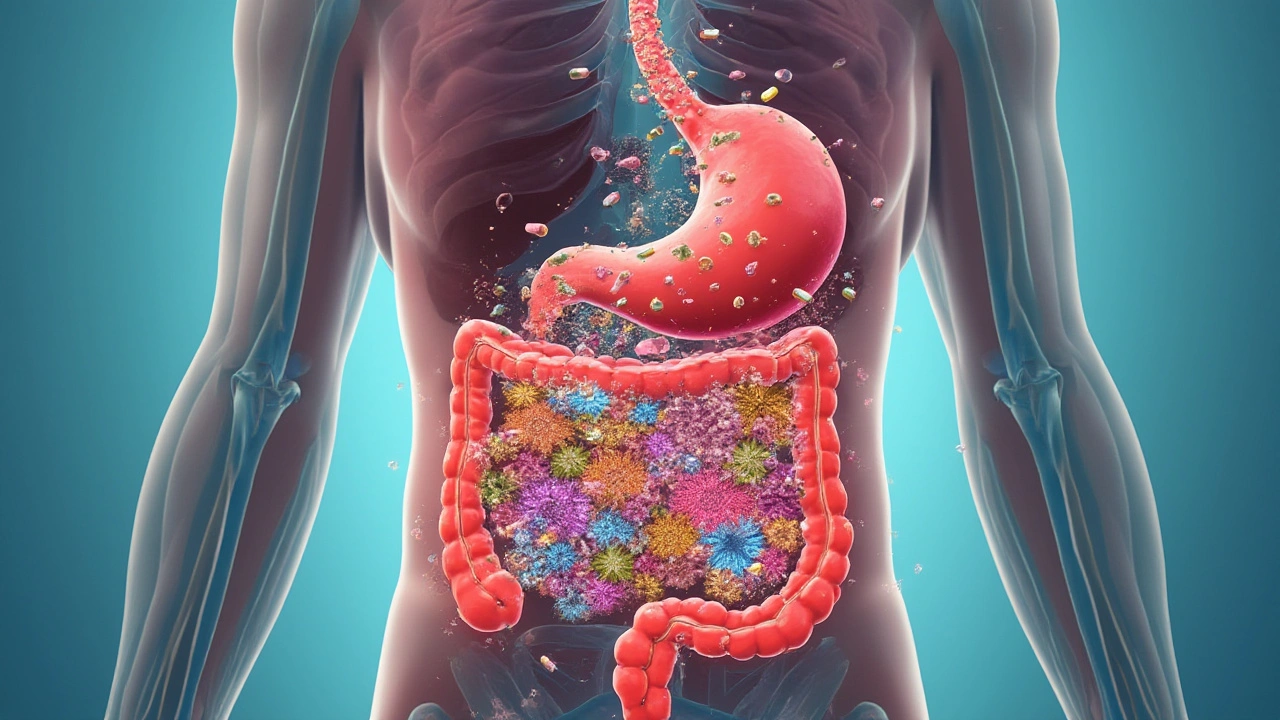If you thought medication's only job was to target your symptoms, think again. What you swallow doesn’t just travel to a sore knee or a feverish head. Every pill takes a pit-stop in your gut, where trillions of bacteria—the microbiota—have stories of their own. Researchers now believe that the very medications meant to heal may quietly be shape-shifting the community of microbes inside you, sometimes leaving lasting fingerprints on digestion, immunity, and mood. The craziest part? You probably won’t feel a thing—until you suddenly do.
The Unseen World Inside: What Is Gut Microbiota?
Picture your gut like a bustling metropolis, teeming with life. Trillions of bacteria, fungi, viruses, and archaea set up shop along your digestive tract, mostly in the large intestine. This isn’t a health supplement sales pitch—it’s proven in DNA sequencing labs from Boston to Tokyo. The balance in this microscopic city holds immense power over everything from digesting food to producing vitamins like B12 and K2, to teaching your immune system to know friend from foe.
Your gut microbiota isn’t a static bunch, either—they’re constantly in flux, shaped by what you eat, where you live, and, yes, what medications pass through. Researchers from the Human Microbiome Project discovered that no two people have the exact same mix of gut microbes. It’s as personal as your fingerprint. That’s why when you introduce medicines (from painkillers to antacids), you throw a surprise party for your gut bugs—and not all guests want to stay.
Most folks don’t realize that gut microbes break down complex carbs that would otherwise pass right through us. They make short-chain fatty acids (like butyrate), which help feed colon cells and may even keep inflammation in check. Some produce neurotransmitters—serotonin, GABA—potentially tuning your mood. Lose the right bugs, and the dominoes start to fall. Scientists now suspect that everything from irritable bowel syndrome to obesity, diabetes, and autoimmune diseases may be tied to shifts in this hidden world. It’s not science fiction; it’s happening inside you right now.
How Medications Reshape the Microbiome
If you’ve ever taken antibiotics, you know the warnings: “Finish the course, watch out for diarrhea.” But the scope of medication effects goes way beyond antibiotics, and it’s only in the past decade that we’re really mapping who’s at risk and why. One large Dutch study sequenced stool samples from two thousand people and found that nearly a third of common drugs—from metformin to statins and proton pump inhibitors—significantly changed gut bacteria profiles. Here’s how:
- Antibiotics: These remain the heavyweights. They wipe out infectious bacteria—and a lot of innocent bystanders. Take amoxicillin or ciprofloxacin, and up to half your gut species might disappear for weeks or even months. Some never recover fully, paving the way for less-friendly bugs like Clostridioides difficile to crash the party.
- Non-Antibiotic Meds: Think painkillers (NSAIDs like ibuprofen), diabetes meds (metformin), antidepressants, and antacids (especially proton pump inhibitors or PPIs). Studies have found that PPIs can make your gut more welcoming to Enterococcus, Staphylococcus, and Streptococcus—bacteria you don’t want taking over, since some strains increase risk of gut infections or inflammation. Metformin, a staple in type 2 diabetes, increases certain bacteria tied to improved blood sugar but also bumps up loose stools for a lot of people.
- Even Over-the-Counter Choices: Laxatives, antidiarrheals, and aspirin don’t just zip through your body. Each class has been shown to shift microbiome balance, sometimes spurring mild discomfort, and sometimes more lasting changes.
The fun kicker? The same medication can cause different microbiome shifts from one person to the next. Genetics, diet, and the starting point of your bugs all play a role. The bottom line: your prescription may be one-size-fits-all, but its gut ripple is anything but predictable.

Why Gut Microbiota Shifts Matter for Your Health
When your gut’s ecosystems change, effects ripple far beyond digestion. Sure, you might notice gas, bloating, or a sudden intolerance to your favorite foods after a round of antibiotics. But subtle, long-range effects are trickier to spot. Changes in gut bacteria can lower production of good fatty acids, ramp up inflammation, open the door to pathogens, and even mess with how you absorb or react to nutrients and other drugs.
Researchers at Stanford tracked kids who’d taken several rounds of antibiotics. They found their gut bugs returned, but with fewer protective strains—making it easier for troublemakers to move in. That’s part of why C. diff infection skyrockets after antibiotics. These nasty bugs find a home and out-compete what’s left. The effects aren’t just on your stomach, either. Some folks see mood rattles, energy dips, or skin flare-ups—all linked to that important word: dysbiosis (a lopsided, unhealthy microbiome).
It doesn’t always stop there. A Harvard study on PPIs found that regular use could double your risk of certain gut infections, like Salmonella and Campylobacter. Diabetics on metformin sometimes find their guts adapting in ways that help with glucose, but also bump up gas and discomfort. Some research even hints at antidepressants steering gut bugs toward species that might influence mental health. The line runs both ways: as your microbiota changes, your ability to make vitamin B12, vitamin K, or even maintain a stable weight can shift, too. So if you’ve been popping certain pills and notice weird new symptoms, it’s not all in your head—it could be in your gut.
Tips for Protecting and Restoring Your Gut Microbiota
If you can’t always skip the meds (and sometimes you really shouldn’t), how do you give your microbiome a fighting chance? Science offers a few practical moves:
- Eat the rainbow. Fiber-packed veggies, fruits, and whole grains are like food for your good bugs. The more plant diversity, the richer your microbiota.
- Fermented foods matter. Yogurt with live cultures, kimchi, sauerkraut, kefir—these all bring live bacteria to your gut. Some research shows that probiotic-rich food can speed up microbiome rebound after antibiotics or PPIs, and make a real difference in day-to-day gut resilience.
- Think twice on antibiotics. If you’re sick, sometimes antibiotics are non-negotiable. But push for testing when possible, avoid taking them for viruses, and never dose yourself "just in case." Your bugs will thank you.
- Ask your doctor about alternatives. For chronic issues needing PPIs, NSAIDs, or metformin, see if lifestyle shifts might dial back your dose. Even spacing meds (with food or at a different time of day) can help your gut bugs recover.
- Probiotics aren’t a cure-all. But after a round of strong antibiotics, certain strains (like Saccharomyces boulardii or Lactobacillus rhamnosus GG) may reduce risk of antibiotic-associated diarrhea. Check labels and aim for products with proven strains rather than generic “more than one billion bacteria.”
- Don’t forget the basics: Move your body, hydrate, and skip unnecessary ultra-processed foods. All these choices foster a healthier biome and better recovery after medical hiccups.
Gut health isn’t a single supplement—it's your daily choices, the medicines you take, and the unique city of microbes living inside you. The science isn’t done evolving, but next time you pop a pill or reach for an antacid, spare a thought for the tiny tenants along for the ride. It could shape not just your digestion, but your energy, immunity, and mood for years to come.

